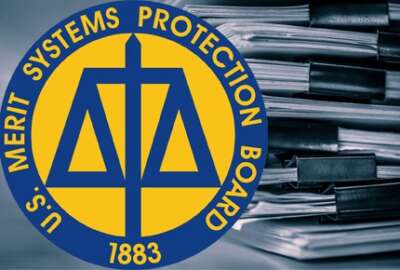

A series of appointments clause challenges have created a second, albeit much smaller, backlog of pending cases awaiting action from the Merit Systems Protectio...
For agencies with administrative judges, a 2018 Supreme Court case has created a messy, albeit solvable, situation in recent years.
But at the moment, it’s not solvable for the Merit Systems Protection Board, which, without a single board member to weigh in on certain appeals, must rely on its administrative judges to issue initial decisions and keep the agency relevant while it lacks permanent, Senate-confirmed leadership.
In Lucia v. Securities and Exchange Commission, the Supreme Court determined administrative law judges at the agency were “officers of the United States,” exercised “significant authority,” and, therefore, were subject to the appointments clause of the U.S. Constitution.
The decision forced agencies like the SEC to revisit the appointment scheme and authorities for their judges.
Two years after Lucia, a handful of agencies have caught on to the debate, federal employment attorneys say. Some agencies have realized they too can draw on Lucia to challenge the authority of an MSPB administrative judge, delaying legal proceedings in the process.
And without a Senate-confirmed board to weigh in on the matter, it’s thrown more than 100 cases into limbo.
In essence, the legal challenges have created a second, side backlog of pending appeals that MSPB administrative judges have dismissed without prejudice because a party has raised an appointments clause concern.
There were roughly 180 appeals that fall in this category as of the end of December, said Bill Spencer, an MSPB spokesman.
The number pales in comparison to the number of petitions for review — 3,124 at the end of January according to MSPB data — that are pending before a quorum-less board.
But the estimate still surprised federal employment attorneys, many of whom have been tracking the issue and have tried on their own to tally how many appeals are in limbo due to Lucia concerns.
“It was far more than I had anticipated,” said Debra D’Agostino, a partner with the Federal Practice Group. “I thought we were still looking at a handful. It certainly looks like a lot of agencies are filing these motions now. I haven’t been able to make any sense yet of when they file these motions and when they don’t. The haphazard nature of it is certainly tricky to deal with, and you never know when they’re going to hit you with a motion. I’ve had cases where we’re heading to a hearing and then everything is put on ice. It’s definitely getting messy.”
Dan Meyer, a managing partner with Tully Rinckey law firm, said he’s seen more agencies proactively raise Lucia challenges before MSPB administrative judges in the last two years.
He said larger agencies with well-established, tenured legal staffs tend to raise the challenges.
In their own searches of Westlaw’s legal research service, attorneys like D’Agostino and others have noted cases involving the Departments of Veterans Affairs and Homeland Security, as well as the Agriculture, Justice and Navy Departments.
The Department of Health and Human Services has asserted several Lucia challenges in the last two-to-three years, said Jim Eisenmann, a partner at Alden Law Group and a former general counsel and executive director at the MSPB.
“HHS just flies off the page,” he said.
Attorneys haven’t seen as many smaller agencies file similar challenges, but both Eisenmann and D’Agostino noted at least one case involving the Equal Employment Opportunity Commission.
Not all agencies have asserted Lucia challenges in cases before an MSPB administrative judge, the attorneys said, and those who have used the argument do so at different stages and in different ways.
“If it’s an agency’s opinion that these judges aren’t legally appointed, then obviously it should be in all cases,” D’Agostino said. “The way they’ve been picking and choosing these things is a frustration, and it’s really unfair to create even more uncertainty for the employees needing to appeal. We’re looking at potentially years before this is resolved.”
Ultimately, the MSPB needs a quorum with at least two Senate-confirmed members to examine how, given the Lucia decision, administrative judges at the agency should be appointed — and who should appoint them.
But since the board hasn’t had a quorum for more than four years, some employees and agencies whose cases have been dismissed without prejudice have waited years for their cases to be resolved.
The situation is frustrating, Meyer said, because the appeals go “into a cul-de-sac” once an administrative judge agrees to dismiss the case without prejudice.
“You can’t get out of the board because [it’s] … essentially a government body with nobody home,” he said.
Those with pending appeals will continue to wait until the Biden administration names new board members and the Senate confirms them.
“They’re waiting a long time,” Eisenmann said. “I will assume that if you had board members there magically tomorrow, this would be one of the first cases that they would decide.”
The MSPB has suggested that, once a quorum is restored, new members would quickly examine the appointments clause issue.
The U.S. Court of Appeals for the Federal Circuit allowed the MSPB to intervene last summer in a case, McIntosh v. the Department of Defense, where both parties each made two separate appointment clause arguments.
Citing Lucia, DoD again raised the argument that MSPB administrative judges were improperly appointed.
In its brief to the court, the MSPB described its intent to review the appointments of its administrative judges.
“If the board should determine that MSPB administrative judges are vested with such strong authority that they are, indeed, principal officers, the board may reduce the administrative judges to inferior officer status by modifying its procedures to weaken their authority or taking other remedial steps, such as altering its procedures that allow administrative judges to review and decide appeals in the first instance,” the MSPB’s response reads. “And if the board should find that the administrative judge was an invalidly appointed inferior officer, the board could remedy that situation by reappointing its administrative judges and reassigning the appeal to a different administrative judge.”
Once the MSPB does review the appointments of its judges, employees and agencies can begin to refile their appeals.
“What some agencies realize is that you might kick the bucket down the road, but that’s all this is,” D’Agostino said. “Either [the board] is going to decide there are properly appointed AJs, or they’re going to properly appoint them. One way or the other, at some point, these cases will be adjudicated.”
Still, the situation has put employees in limbo, leaving federal employment attorneys to question why agencies are drawing on the Lucia argument — for some cases and not others — in the first place.
Some agencies may see it as a stalling technique, the attorneys said.
“I think they figure that some employees will give up, move on and get over it, and they’d rather deal with that than an employee walking back through that door. That happens. It is really hard for someone to hang on to this kind of litigation for years. Most people are going to get another job. They are going to move on,” D’Agostino said. “If it’s something like a whistleblower case, I can certainly see agencies making the decision that putting the matter out of sight, out of mind is the way to go, certainly to the frustration of employees.”
Copyright © 2024 Federal News Network. All rights reserved. This website is not intended for users located within the European Economic Area.
Nicole Ogrysko is a reporter for Federal News Network focusing on the federal workforce and federal pay and benefits.
Follow @nogryskoWFED


